Chad. Koupor. Mission of Hope.
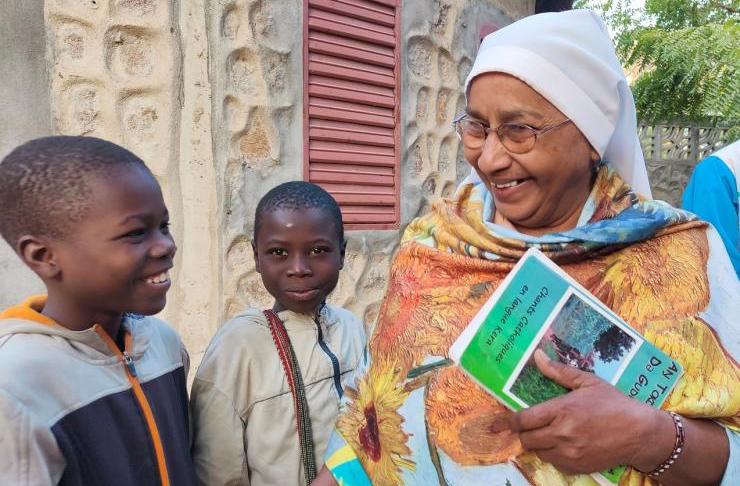
In a remote corner of Chad, three missionaries of the Immaculate Conception give a simple Christian testimony.
Walking alongside people.
Hilda, Shephali, and Irene are three Missionary Sisters of the Immaculate Conception present in Koupor, in the south-west of Chad, on the border with Cameroon, where they arrived in February 2019.
In the past, there had been some Burundian sisters, but none had been there for five years. “They gave us a big party when we arrived!”, they remember. Even though no one knew them, and most people aren’t even Christians. Yet these three nuns, with their great simplicity and unbelievably poor means, manage to make people experience, through small gestures, a sense of respect and care for the people with whom they share their lives.
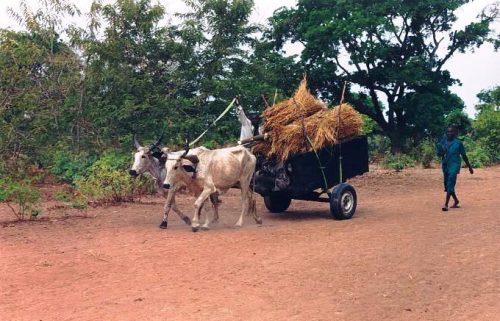
Everything is lacking: roads, water, schools, health centres… File swm
Just being there is a great sign because in Koupor, as well as in the surrounding villages, there is nothing and no one. There are no state works of any kind and no NGOs. Everything is lacking: roads, water, schools, health centres… People live in extreme poverty and are increasingly at the mercy of a changeable climate, balanced between terrible droughts and devastating floods. Either there is no water or there is too much.
Now is the time of the floods, but until a few weeks ago the savannah was scorched by temperatures above 50 degrees, and water and millet – the basic element of nutrition – had become very rare commodities.
In the rainy season, however, when the earth appears wrinkled and furrowed by deep cracks, real lakes are created that further accentuate the isolation of this village and the entire area. Even the missionaries, who normally travel by bicycle or motorbike on sandy paths, must use the canoe to travel over these expanses of water that are increasingly associated with devastating climatic events that cause destruction and displacement of people.
It is a land of extremes in which these three nuns from different countries, generations and experiences live their mission, and today find themselves sharing the joy of bearing witness to the Gospel in this part of the world also through gestures of closeness and charity.
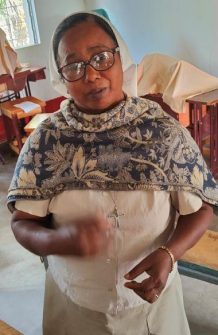
Sr. Shephali. Her main commitment is to the group of girls. Photo: A. Pozzi
Sister Hilda, from India, is a veteran of the group. She has 36 years of experience in Cameroon, first in the South in Ambam, and then in the Far North. “When I arrived, it was a very poor and abandoned region, but I saw great changes. Here, however, there is nothing”.
This mission in Koupor is a constant challenge. Not only due to the climate but especially due to the backwardness of the place. Even the simplest things become complicated. She experiences this every day in the dispensary they renovated. Everything is very basic but clean and tidy: there is even a small laboratory, solar panels, and a water pump. “But there are no medicines”, Sister Hilda says, showing us the almost empty warehouse. “The government doesn’t give anything except vaccines and it’s not easy to get them because transportation is extremely difficult. Normally we get them from Caritas which also pays the salaries of the staff”.
There are currently two nurses and a midwife. But the patients are very few as are the women who come to give birth – five in the last month. Almost all of them continue to have their babies at home and go to the dispensary only in case of complications, sometimes making difficult journeys by motorbike or on the back of a donkey.
Nurse Valentin shows us the register of visits: fewer than three thousand patients a year, an average of nine a day. “People don’t come to the dispensary because often they don’t even have the few pennies needed to pay for medical tests or medicine, but also because they don’t even know that they can get treatment here. This is why we are doing a lot of awareness work and vaccination campaigns in the villages”, explains Sister Hilda. “But it’s a question of mentality. People often don’t understand the importance of going to the dispensary or even of sending children to school”.
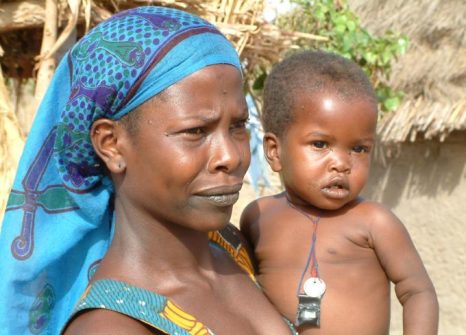
A mother with her child. Almost all women continue to have their babies at home. They only go to the dispensary if there are complications. File swm
The other two nuns who dedicate themselves to the education of girls and to pastoral care, as well as to mission schools, also experience this. Sister Shephali has just returned from Bangladesh, where she went on holiday after a long-forced absence due to the Covid-19 pandemic. She also has 17 years of experience in Cameroon behind her. Then she got back into work in Koupor, just across the border in a similar territory and with similar people, but with very different challenges. Her main commitment is with the group of girls in the cutting and sewing course which also becomes an opportunity for broader training, also carried out in extra-curricular moments in a small house within the mission.
“The course is spread over three years. The first two are attended by about fifteen girls each. The third only from the best”, explains Sister Shephali, while she tries to start the lesson with girls who arrive late, some children crying and others running away. “It is not easy to give continuity to this course, because they themselves live in precariousness. Some start and then stop coming, others get married, and others have children. There is one now who comes with her child”. Everything must be managed with a lot of patience and determination.
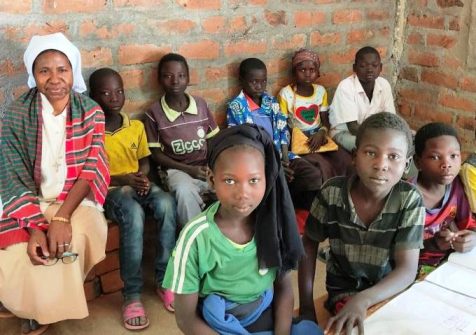
Sister Irene is in charge of pastoral activities, catechesis for children and young people. Photo: A. Pozzi
Sister Shephali knows well that for these girls it is a unique opportunity not only to learn a trade and contribute to their families’ meagre finances, but also to have a minimum amount of training. She adds “Many of them are illiterate and so, in addition to cutting and sewing courses, we do some literacy, French language, hygiene and cooking courses, and what is called ‘Eva’ here: education in life and love”.
Unfortunately, in these areas, girls are often excluded from the education system, which in Chad is very precarious. The mission is building several schools or replacing classrooms made of millet stalks and straw with brick buildings. But then there is a lack of qualified teachers and those who exist are not paid. The Koupor school – the first in the entire area, founded by Oblate missionaries – and the surrounding ones all belong to the community. That is, they are managed by a committee of families who have to pay all the expenses, including salaries. In Koupor, where there are 230 students, the staff is complete and usually manages to keep to the schedule. But this is an exception. The mission also provides most of the books, but there are not always enough for all the teachers. For this reason, there is also a small library that is managed by some volunteers, together with Sister Irene.
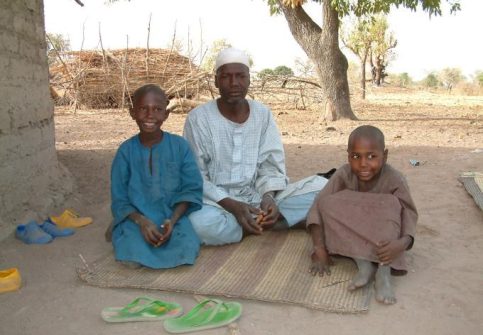
The father with his two sons sitting outside the home. File swm
Originally from Papua New Guinea, Sister Irene is the youngest of the group. Before arriving in Chad, she spent a few years in Italy and seven months in Cameroon. She now takes care of pastoral activities, and the catechesis of children and young people. She reflects “Koupor is a very isolated and closed context, in every sense, which develops very slowly. We continually experience this by going to the villages for pastoral work. What we do is first of all is to give support to the catechists who carry out the bulk of the work and we verify the progress made by the Christian communities. The people are always welcoming, even if they often have nothing”.
The children, then, are always very much enjoying themselves. Above all, it is their voices that fill the silence of the evening, when darkness descends and envelops everything. A single faint light, that of the mission chapel, illuminates the darkness and is soon filled with songs and prayers. The parish priest and the three missionaries of the Immaculate lead a small procession of children, women and young people who gather in this circular building, similar to the local homes. The sound of the tom-tom gives rhythm to the songs. And prayer gives meaning to the day. It is a precious moment of thanks, trust, and hope in the flow of lives marked by precariousness. (Open Photo: Sister Hilda has worked in Africa for 36 years. A.Pozzi)
Anna Pozzi/MM



